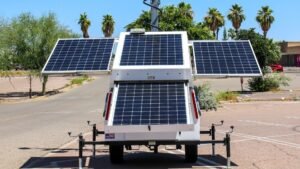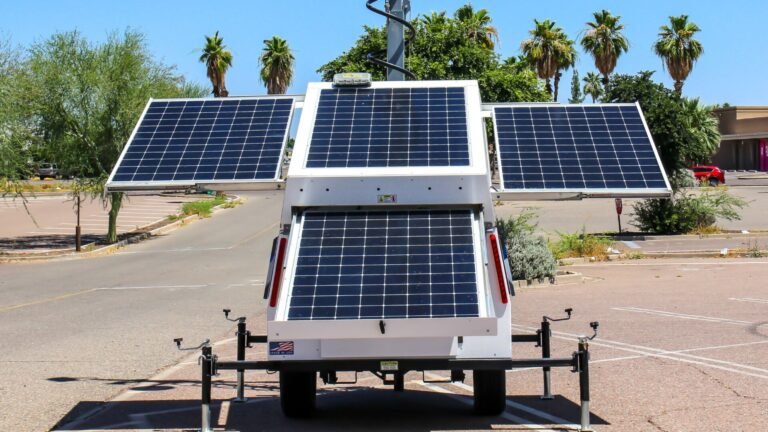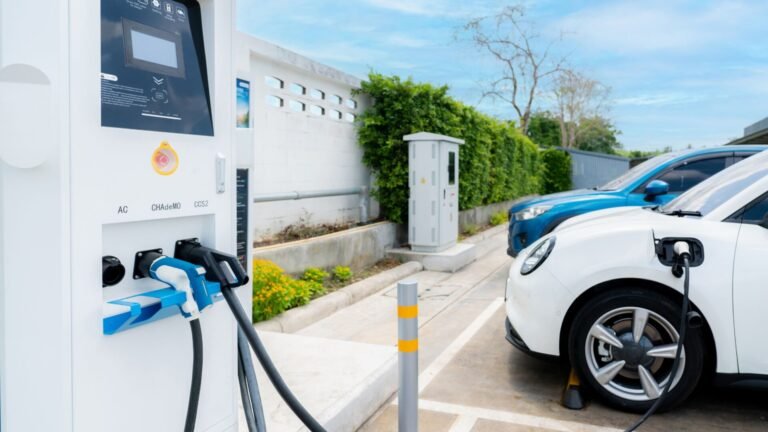The transition to sustainable energy sources is a global priority, and businesses worldwide are adopting green initiatives to reduce their carbon footprint and promote environmental sustainability.
One significant stride in this direction is the integration of solar power for Electric Vehicle (EV) charging stations at workplaces.
Particularly, the use of advanced solar panel technology, such as (TOPCon), is revolutionizing this space by offering efficient, cost-effective, and eco-friendly solutions for powering EV charging stations.
This blog explores the myriad benefits of using solar power, particularly TOPCon technology, for EV charging stations at work.
Embracing Clean Energy for Transportation
The shift towards electric vehicles is a crucial step in reducing greenhouse gas emissions and combating climate change.
However, the environmental benefits of EVs are maximized when they are powered by renewable energy sources, such as solar power.
By installing solar-powered EV charging stations at work, companies can ensure that the vehicles are charged using clean energy, thereby reducing reliance on fossil fuels and lowering the overall environmental impact of their transportation needs.
Economic Advantages
The integration of TOPCon solar panels for powering EV charging stations presents significant economic benefits for businesses.
Firstly, solar energy can substantially reduce the electricity costs associated with charging EVs.
While the initial setup cost for solar panels may be considerable, the long-term savings on energy bills and the increasing efficiency of solar technologies, especially TOPCon panels, ensure a favorable return on investment.
Furthermore, businesses can capitalize on various government incentives, tax credits, and rebates available for renewable energy installations, making the transition to solar-powered EV charging stations more financially attractive.
Additionally, offering free or discounted EV charging can be an excellent perk for employees, aiding in talent attraction and retention without incurring high costs.
Enhancing Corporate Image and Sustainability Goals
Incorporating solar-powered EV charging stations at the workplace significantly boosts a company’s corporate image.
It demonstrates a firm commitment to sustainability and environmental responsibility, aligning with the growing consumer and stakeholder demand for green business practices.
By adopting this green initiative, companies can improve their brand reputation, customer loyalty, and competitive edge in the market.
Moreover, this move supports corporate sustainability goals, such as reducing carbon emissions and promoting the use of clean energy.
It contributes to achieving global sustainability targets and can enhance a company’s standings in environmental, social, and governance (ESG) assessments, which are increasingly important to investors and partners.
Employee Benefits and Workplace Satisfaction
Offering solar-powered EV charging stations at work provides direct benefits to employees who own or are considering purchasing electric vehicles.
It facilitates convenient charging during work hours, reduces range anxiety, and can offer cost savings compared to home charging, particularly if companies provide charging as a free benefit.
This not only enhances workplace satisfaction but also encourages the adoption of electric vehicles among the workforce, contributing to a greener, cleaner environment.
Moreover, this initiative can help foster a community of environmentally conscious individuals within the company, promoting sustainable lifestyles and creating a more engaged and motivated workforce.
Employees are likely to take pride in working for an organization that takes tangible steps towards sustainability, improving overall job satisfaction and loyalty.
Reliability and Energy Independence
Solar-powered EV charging stations can increase a company’s energy independence and ensure reliable charging solutions for employees.
By harnessing solar energy, businesses can reduce their dependency on the local power grid, which can be particularly advantageous during power outages or periods of high electricity demand.
Additionally, modern solar panel technologies like TOPCon offer higher efficiency rates and better performance in various light conditions compared to traditional solar panels.
This means that solar-powered EV charging stations can provide a consistent and reliable energy supply throughout the year, further enhancing the appeal and usability of workplace charging facilities.
Contribution to the Energy Grid and Community
Businesses implementing solar-powered EV charging stations can also contribute surplus energy to the local grid, supporting community-wide efforts to transition to renewable energy sources.
In regions with net metering policies, companies can receive credits for the excess electricity they supply to the grid, further offsetting their energy costs.
Moreover, by promoting the use of renewable energy and electric vehicles, companies can play a pivotal role in their communities, leading by example and encouraging other businesses and individuals to adopt sustainable practices.
This collective effort can significantly impact the local and global environment, reducing carbon emissions and promoting clean energy usage.
Conclusion: A Step Towards a Sustainable Future
In conclusion, the benefits of using solar power, particularly TOPCon technology, for EV charging stations at work are manifold, encompassing economic, environmental, and social advantages.
By investing in solar-powered charging infrastructure, businesses can reduce their environmental impact, save on energy costs, enhance their corporate image, and provide valuable benefits to their employees and communities.
As we move towards a more sustainable future, the integration of clean energy solutions like solar-powered EV charging stations will be crucial in promoting the widespread adoption of electric vehicles and achieving global sustainability goals.
Companies that embrace these innovations today will not only contribute to a greener planet but will also position themselves as





